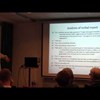better
Do good. And do it better
Do you ever donate money to a charitable cause? If you do, how do you choose what cause to favour? The Scottish philosopher William MacAskill says that we are generally quite bad at regarding donation
Webinar: The Urgency of Prototyping Better Futures
If we wish to achieve a more inclusive, sustainable, diverse and equitable world, we urgently need a diversity of perspectives to imagine – and to build – better futures. The problems we face today arBased on experiments made at the Museum of Tomorrow in Rio de Janeiro, this presentation will show how positive futures can be prototyped to inspire change. Using key techniques, processes, methodologies, mindsets and tools, you too can become an active participant in shaping preferred futures!Welcome to a seminar with Marcela Sabino, a foresight strategist, creative director and innovation designer.This seminar is organized by Positive Future and is free upon registration. .
Non-transitive better than relations and rational choice
in: Philosophia 48 (2020) AbstractThis paper argues that decision problems and money-pump arguments should not be a deciding factor against accepting non-transitive better than relations. If the reason

Do good and do it better. Interview with William MacAskill
Gustaf Arrhenius, director at the Institute for futures studies in Stockholm, interviews philosoper William MacAskill about effective altruism, doing good better.
Using big data to achieve better public health - new project
How can we in a systematic way understand what is causing better health in people? And how can we most efficiently use the resources of the public sector to turn around the development towards greater
Higher-achieving children are better at estimating the number of books at home: Evidence and implications
Frontiers in Psychology Abstract The number of books at home is commonly used as a proxy for socioeconomic status in educational studies. While both parents’ and students’ reports of the number of books
We are working towards a better future – with your engagement we can go further
On several key issues, societies around the world are at crossroads. How can climate change be addressed? How will democracy evolve in the world? How will technological breakthroughs shape our lives? H

Implicit Mind: Implicit Cognition and Self-Perception with Petter Johansson
Recording from the Implicit Mind Workshop at the Institute for Futures Studies in Stockholm, May 2015.
Emergent hierarchical structures in multiadaptive games
2011. Phys. Rev. Lett. 106: 028702. We investigate a game-theoretic model of a social system where both the rules of the game and the interaction structure are shaped by the behavior of the agents. We ca
The Affirmative Answer to the Existential Question and the Person Affecting Restriction
in: Weighing and Reasoning. Themes from the Philosophy of John Broome, Eds.Iwao Hirose and Andrew Reisner, Oxford University Press. The person affecting restriction states that one outcome can only be








